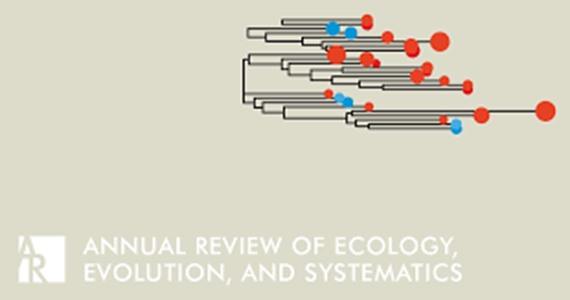Density-Dependent Selection
IF 11.2
1区 生物学
Q1 ECOLOGY
Annual Review of Ecology, Evolution, and Systematics
Pub Date : 2023-08-04
DOI:10.1146/annurev-ecolsys-110321-055345
引用次数: 1
Abstract
Density-dependent selection, which promotes contrasting patterns of trait means at different population densities, has a long history in population genetics and ecology. The unifying principle from theory is that density-dependent selection operates on phenotypic traits whose values counter the effects of whatever ecological agent is limiting population growth, be it resource competition, predators, or pathogens. However, the complexity inherent in density dependence means that the same selective process can generate multiple outcomes, depending upon the details of how population density affects vital rates and the age or size structure of a population. Failure to appreciate the potential for multiple outcomes confounded many early studies of the process. Nonetheless, careful empirical work in laboratory studies, long-term field studies, and studies of sexual selection demonstrates the wide reach of density-dependent selection. The inconsistent outcomes observed in these studies call for renewed research into how the details of density dependence channel adaptive responses. Expected final online publication date for the Annual Review of Ecology, Evolution, and Systematics, Volume 54 is November 2023. Please see http://www.annualreviews.org/page/journal/pubdates for revised estimates.密度制约的选择
密度依赖选择促进性状手段在不同种群密度下的差异模式,在种群遗传学和生态学中有着悠久的历史。理论的统一原则是,密度依赖性选择作用于表型性状,其值抵消任何限制人口增长的生态因子的影响,无论是资源竞争、捕食者还是病原体。然而,密度依赖性固有的复杂性意味着相同的选择过程可以产生多种结果,这取决于人口密度如何影响生命率、人口年龄或人口规模结构的细节。由于未能认识到多种结果的可能性,许多早期的研究都对这一过程感到困惑。尽管如此,在实验室研究、长期实地研究和性选择研究中进行的仔细实证工作表明,密度依赖选择的影响范围很广。在这些研究中观察到的不一致的结果要求重新研究密度依赖通道适应性反应的细节。预计《生态、进化和分类学年度评论》第54卷的最终在线出版日期是2023年11月。修订后的估计数请参阅http://www.annualreviews.org/page/journal/pubdates。
本文章由计算机程序翻译,如有差异,请以英文原文为准。
求助全文
约1分钟内获得全文
求助全文
来源期刊
CiteScore
19.90
自引率
1.70%
发文量
21
期刊介绍:
The Annual Review of Ecology, Evolution, and Systematics is a scholarly publication that has been in circulation since 1970. It focuses on important advancements in the areas of ecology, evolutionary biology, and systematics, with relevance to all forms of life on Earth. The journal features essay reviews that encompass various topics such as phylogeny, speciation, molecular evolution, behavior, evolutionary physiology, population dynamics, ecosystem processes, and applications in invasion biology, conservation, and environmental management. Recently, the current volume of the journal transitioned from a subscription-based model to open access through the Annual Reviews' Subscribe to Open program. Consequently, all articles published in the current volume are now available under a CC BY license.

 求助内容:
求助内容: 应助结果提醒方式:
应助结果提醒方式:


